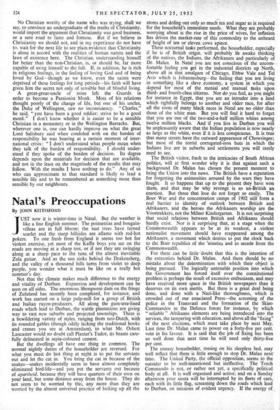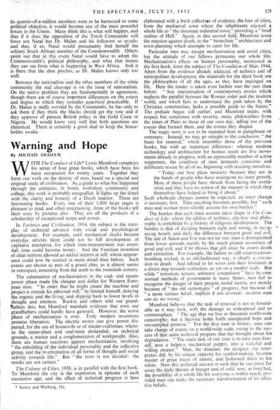Natal's Preoccupations
By JOHN KITTESFORD
JUST now it is winter-time in Natal. But the weather is like a fine English summer. The poinsettias and bougain- villeas are in full bloom; the rust trees have turned scarlet and the steep hillsides are aflame with red-hot pokers. To one fresh from England it seems too hot for violent exercise, yet most of the Kaffir boys you see on the roads are moving at a sharp trot, or if not they are swinging along at a sharp pace to the tune., of the almost inevitable Zula guitar. And as the sun sinks behind the Drakensberg, and the valley of a thousand hills turns from violet to deep purple, you wonder what it must be like on a really hot summer's day. Not that the climate makes much difference to the energy and vitality of Durban. Expansion and development can be seen on all sides. The enormous Shongweni dam on the fringe of Zululand has recently been completed, for instance, and work has started on a large pulp-mill for a group of British and Italian rayon-producers. All along the gum-tree-lined roads which lead to Durban, the wattle plantations are giving way to vast new suburbs and projected townships. There is a bewildering variety of styles, ranging from neo-Dutch, with its rounded gables (though oddly lacking the traditional hooks and cranes you see at Amsterdam), to what Mr. Osbert Lancaster would no doubt call Planter's Tudor, its beams care- fully delineated in sepia-coloured cement. But the dwellings all have one thing in common. The normal nightly duties of the householder are reversed. For what you must do last thing at night- is to put the servants out and let the cat in. You bring the cat in because of the snakes—snakes incidentally seem to have almost completely eliminated bird-life—and you put the servants out because of apartheid, because they will have quarters of their own on your land, but some distance away from the house. They do not seem to be worried by this, any more than they are worried by the almost universal practice of locking up all the stores and doling out only so much tea and sugar as is required for the household's immediate needs. What they are probably worrying about is the rise in the price of wives, for inflation has driven the market-rate of this commodity to the unheard of height of ten or eleven cows apiece. These nocturnal tags performed, the householder, especially if he is of British origin, will probably lib awake thinking of the natives, the Indians, the Afrikaners and particularly of Dr. Malan. In Natal you are not conscious of the uncom- fortable feeling you get in the industrial districts up North, above all in that amalgam of Chicago, Ebbw Vale and Tel Aviv which is Johannesburg—the feeling that you are living in something like a slave economy, a system in which you depend for most of the menial and manual tasks upon third- and fourth-class citizens. Nor do you feel, as you might for instance in Egypt, that you are an intruder into a land which rightfully belongs to another and older race, for after all the roots of many black races in Natal are no older than those of the white man. 13 ut you will find it hard to forget that you are one of the two-and-a-half million whites among twelve million blacks. And if you live in Durban you will be unpleasantly aware that the Indian population is now nearly -as large as the white, even if it is less conspicuous. It is true that many streets have the outward appearance of Chowringee; but most of the torrid corrugated-iron huts in which the Indians live are in suburbs and settlements you will rarely need to see.
The British visitor, fresh to the intricacies of South African politics, will at first wonder why it is that against such a background Dr. Malan has chosen the present moment to bring the Union into the news. The British have a reputation for forgetting the animosities aroused by the wars they have fought. It so happens that up to the present they have won them, and that may be why revenge is so un-British an emotion. But those that lose do not forget so easily. The _Boer War and the concentration camps of 1902 still form a real barrier to identity of outlook between British and Afrikaners, and the heroes the Afrikaners worship ate the Voortrekkers, not the Milner Kindergarten. It is not surprising that social relations between British and Afrikaans should hardly exist. Nor is it surprising that, at a stage when the Commonwealth appears to be at its weakest, a violent nationalist movement should have reappeared among the Afrikaners, a movement which desires to put the clock back to the Boer republics of the 'nineties and to secede from the Commonwealth.
For there can be little-'doubt that this is the intention of the extremists behind Dr. Malan. And there should be no mistake about the determination with which their object is being pursued. The logically untenable position into which the Government has forced itself over the constitutional problem is perhaps-the result of excessive enthusiasm, and may have received more space in the British newspapers than it deserves on its own- merits. But there is a great deal being done, and done with a Nazi-like thoroughness, which is crowded out of our -emaciated Press—the screening of the police in the Transvaal and the formation of the Skiet- Commandos in the Defence forces for instance, by which " reliable " Afrikaans elements are being introduced into the services, the tampering with education, and above all the "fixing" of the next elections, which must take place by next May. Last time Dr. Malan came to power on a forty-five per cent. vote in his favour. It is said that the job of fixing has been so well done that next time he will need only thirty-five per cent. The uneasy householder, tossing on his sleepless bed, may well reflect that there is little enough to stop Dr. Malan next.
time. The United Party, the official opposition, seems to the outsider to be well-intentioned but ineffective. The Torch Commando is not, or rather not yet, a specifically political body at all. It is well organised and active; and on a Sunday afternoon your siesta will be interrupted by its fleets of cars, each with its little flag, screaming down the roads which lead to Durban, on missions of evident urgency. If the energy of its quarter-of-a-million members were one be harnessed to some political objective, it- would become one of the most powerful forces in the Union. Many think this is what will happen, and that if it does the opposition of the Torch Commando will force not Natal but Dr. Malan and his followers to secede, and that, if so, Natal would presumably find herself the solitary South African member of the Commonwealth. -Others point out that in this event -Natal would have to adopt the Commonwealth's political philosophy, and what that means they can see from what is happening in West Africa. And it is there that the shoe pinches, as Dr. Malan knows only too well.
Between the nationalists and the other members of the white community the real cleavage is on the issue of nationalism. On the native problem they are fundamentally in agreement, though there are of course important differences on the extent and degree to which they consider apartheid _practicable. If Dr. Malan is really worried by the Commando, he has only to ask them if they think the blacks should get the vote and if they approve of present British policy in the Gold Coast Or Nigeria. He would know very well that both questions are rhetorical. There is certainly a good deal to keep the house- holder awake.



































 Previous page
Previous page